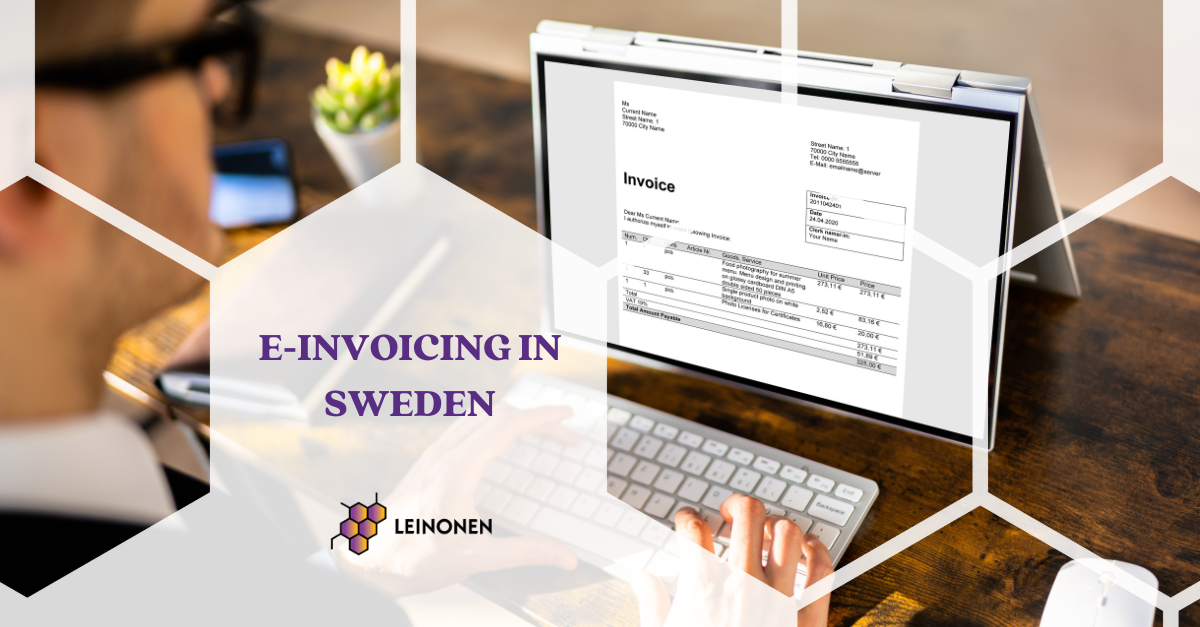Most businesses struggle with managing paper invoices that involves maintaining a huge physical paper trail, avoiding errors, and high processing times. For a business owner or company in Sweden, E-Invoicing is the way forward that offers higher efficiency, leading to better business performance.
E-invoicing, as the name suggests, is invoicing but in an electronic format. It has become an integral invoicing method for companies and businesses in Sweden, driven by legislative mandates, standardization efforts, and the pursuit of efficiency gains. Read to the end to discover how Leinonen can help you transition seamlessly to e-invoicing.
Introduction to E-Invoicing
In electronic invoicing, the supplier and the buyer use an electronic system to exchange documents. The invoice is automatically sent, received, and processed. An important point to note is that the invoice should be sent in a structured electronic format and not just by email. In Sweden, it involves sending invoices as PDF (“Portable Document Format”). Traditional paperwork does not need to be done in this case, and the invoice will arrive immediately.
Navigating E-Invoicing in Sweden
In Sweden, there are no industry-specific needs when it comes to e-invoicing. In Sweden, standard invoicing practices require an invoice to contain information such as invoice number, invoice date, due date, organization number, account number/bank giro number for payment, etc.
E-invoices in Sweden are safer instead of paper invoices because they are digitally signed and can be checked against paper invoices that might get lost in the mail. If you have the correct e-invoice address or e-mail address, it will be entered directly into the accounting system. As long as you have a modern accounting program, it is easy to use e-invoices. There is no need for any additional software.
E-Invoicing from a Business and Accountant’s Perspective
As an accountant or business owner, audits become more manageable with e-invoices as you can easily track information and don’t require conventional paper invoices. Invoices go directly to the accounting software, where AI can provide accounting suggestions or even automatically post them. It requires a good modern accounting program. Accountants still need to check the accounting, but it saves a lot of time and makes it easier to have an overview of received invoices instead of having hundreds of paper invoices in binders to review. The overall accounting process becomes much faster and more efficient.
Advantages of E-invoicing in Sweden
E-invoicing simplifies the invoicing process and saves time. From an operational standpoint, it automates the processes for receiving and paying invoices, resulting in enhanced efficiency. Since paper invoices are no longer needed, it also saves space (no need for archives) and is environmentally friendly.
From an accountant’s point of view, it’s a safer, more efficient approach to handle bills with less room for human mistakes. E-invoicing is a time- and cost-saving technology, as it allows accountants to work faster. All government organizations and municipalities in Sweden are also obliged to accept e-invoicing. Some municipalities have already switched to only using PDF and no longer accept paper invoices. If a company wants to sell its services to the public sector, e-invoicing is a must.
Making the shift from paper invoicing to E-Invoicing in Sweden
It is relatively easy to switch from paper invoices to e-invoices in Sweden. The Swedish market has many accounting software such as Fortnox, Hogia, Visma, etc. As a rule, these programs do not have pre-programs such as Assendo “attest.nu”, Basware, etc., where there is a cost to interpret “AI” for this.
Nowadays, most accounting programs can automatically understand incoming invoices, so all you have to do is manually input the amounts, and the program will automatically calculate the cost. It makes the registration process a breeze. Under electronic invoicing, the system allows you to automate the accounting process or learn your accounting preferences from previous invoices. So, you need to inform all suppliers that you would prefer to get PDF invoices.
The interpretation checks the invoice to see if it has all the necessary information. If it doesn’t, you have to either fix the source or make a new one. It can take cost centres or project numbers, and most of the time, all that needs to be done is checking the data. This is a more efficient way to work. If you don’t know enough about accounting to check, the invoices that you know are for the same booking will be made immediately.
Making an easy switch to E-Invoicing
To receive an electronic invoice, a firm may easily do so using the invoicing programs offered in Sweden. The invoice is generated as a PDF file or delivered as a PDF invoice, with user-friendly options. We can then send by regular email or directly from the invoice program to all customers who receive PDF invoices or submit them in portals.
Leinonen has been assisting businesses in Sweden for almost a decade, giving us invaluable cross-border business knowledge. When you choose us, you can feel confident you have a stable, long-term partner supporting you in Sweden.
Digitization in Sweden has progressed rapidly, and all customers with modern accounting systems can submit their documents directly to the system. Digital verification dates are available for both in and out.
Conclusion
The Swedish government has rolled out many initiatives to make e-invoicing an integral part of businesses to ensure higher efficiency. Many large corporations and government bodies have already transitioned to electronic invoicing, while smaller businesses are gradually following suit. In addition to the primary advantages of e-invoicing, companies should make a switch to this method to remain relevant and conform to overall industry standards.
For more information on how we can help you get started with e-invoicing in Sweden and for advice on what practical steps you can take towards automation please contact us today.





